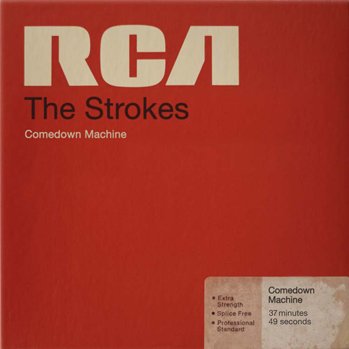Well, if The Strokes never manage to recapture the hot-posh-boys-with-dumb-riffs frisson that once made them such a good time, they’ve at least, with their fifth title, given me a new entry in my budding listicle The 25-Most Unfortunate Unintentionally Apt Album Titles Of All Time. Because fuck me, Comedown Machine is a draaaag. If their last effort, the dreary Angles, was the car-crash, this album feels like months in hopeless traction.
And yet, if the account of bassist Nikolai Fraiture in the one Strokes interview in the run-up to release is to be believed, working relations in the band are much better now than at the start of Angles – this collection of songs, some left over from that album and some written while touring it, was "hashed out all together like the good old days", as opposed to the fragile relationships fractured recording process of last time round.
Fraiture also noted, more revealingly, that "It’s kind of funny that new music doesn’t feel as natural as it used to". Nothing on Comedown Machine really sounds natural either; it comes across awkward, hollow, like dead-chemistry trying listlessly to spark.
Angles at least had ‘Under Cover Of Darkness’, a song that purred with the on-heat energy that once made The Strokes so irresistible. The lead track for this album was the deliberately difficult ‘One Way Trigger’, with its banal, video-game theme synths, and Julian Casablancas’ whiny, dispassionate falsetto.
Often here, it’s Casablancas that seems to be the problem. He’s always set the dominant tone, and whereas once his detachment was haughty and bristling with leather jacket aggro, now it’s a listless, lazy-sounding eyeroll. ‘Tap Out’ opens things in an angsty way, that sort of Hall & Oates-tinged, suave-but-scratchy urban funk pop they’ve been dabbling in for a while now, Julian cracking out his sickly falsetto. It’s not that he doesn’t sound like he’s trying at all; just that things just aren’t quite coming together. ‘All The Time’ sounds like it’s trying to recapture the magic, but trips over itself halfway out of the armchair, while ’50/50′ and ‘Slow Animals’ meander along in a stoned-sounding, complacent fug.
Flickers of excitement come with ‘Partners In Crime’, which manage to summon something akin to fire in its belly, and the closer ‘Call It Fate, Call It Karma’, which has something of the spirit of Strokes pal Adam Green’s recent album with Binki Shapiro, all ’50s pop and faux-vintage production, an example of them trying something different that works, slight as it is. No one wants them to rewrite Is This It over and over again, but surely being The Strokes shouldn’t be, and shouldn’t sound like, such hard work? A lot of Comedown Machine is adequate, but in a way you never had to do with The Strokes at their best, you’re left sort of wondering what the point of this music is. Who it’s for. Why it’s there. I wonder if The Strokes could tell you? Well, given that they’re not talking to the press about it, they either couldn’t or feel like they don’t need to. Perhaps it would be snide to note here that this album will be the final one in the Strokes’ RCA contract. But hey, they’ve bummed us out enough, may as well return the favour.


